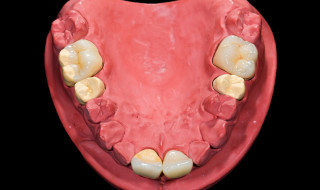
Researchers at the University of Groningen in the Netherlands have developed a technology for 3D-printed teeth that can also keep the mouth free from bacteria.
Andreas Herrmann and colleagues from the University of Groningen embedded antimicrobial quaternary ammonium salts inside existing dental resin polymers, which are positively charged and therefore disrupt negatively charged bacterial membranes, causing them to die.
‘The material can kill bacteria on contact, but on the other hand its not harmful to human cells’, Herrmann told New Scientist.
Further investigation
The bacterial matrix was used to print out a range of dental objects, such as teeth and orthodontics. Tests found that the material killed 99% of bacteria, compared to less than 1% in a control sample without the salt matrix.
However, the technology is not ready for the dental market just yet. ‘For clinical use we need to extend this and investigate the compatibility with toothpaste’, Herrmann said.
The study, ‘3D-printable antimicrobial composite resins’, has been published online in Advanced Functional Materials.


